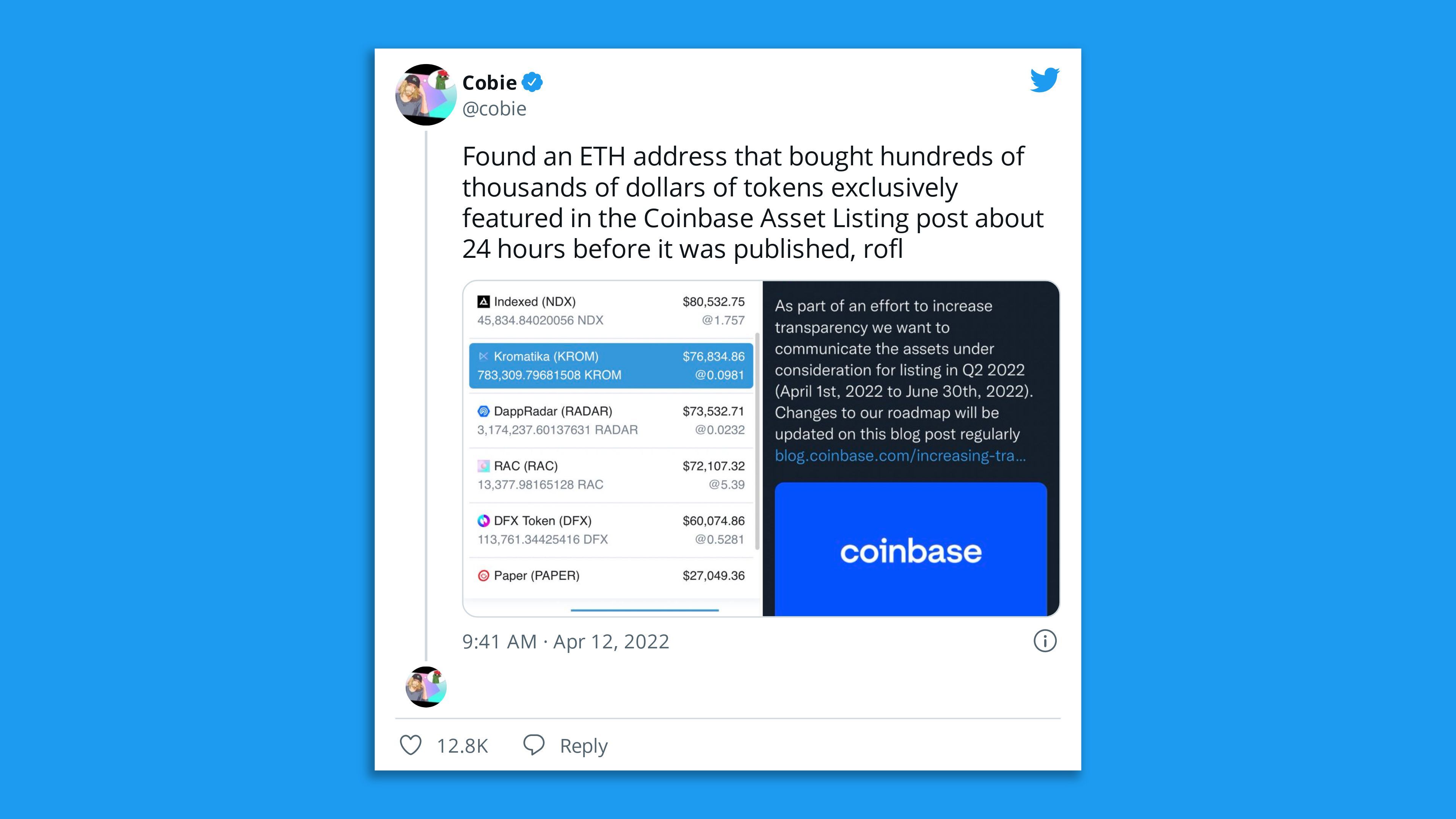Axios Crypto

July 22, 2022
😓 Oh boy, Thursday was a day. Yeesh. If this newsletter ends up being a little confusing, well... yesterday's insider trading case made heads spin.
- 👀 I probably missed something. If you see some relevant detail or comment out there, hit us up: [email protected].
This newsletter was edited by Pete Gannon and is 1,279 words, a 5-minute read.
🧿 1 big thing: Regulation by enforcement
Illustration: Sarah Grillo/Axios
The Department of Justice yesterday announced the arrests of three people in relation to insider trading on privileged information that belonged to Coinbase, the leading crypto exchange in the U.S. (No doubt, as a reader of this newsletter, you know this already.)
- But also: The U.S. Securities and Exchange Commission brought a civil suit against the three for insider trading of unregistered securities.
- There's lots of subtext, Brady writes.
Driving the news: Nine cryptocurrencies were named as securities in the SEC's case, out of 25 that Justice and the SEC said were traded using privileged information.
- More on each in the next section of this newsletter.
Why it matters: What is or isn't a security (as opposed to a commodity) has been the central question for cryptocurrency companies aiming to operate in compliance with U.S. law and regulation.
- Securities have onerous rules around who can own and trade them such that they would be of little use in a startup's product.
- Blockchain startups would prefer a way to go to market that didn't amount to saying "YOLO," launching and waiting to see if they get sued.
Flashback: On Wednesday, I wrote about a hearing in Congress where representatives on both sides of the aisle expressed frustration with the SEC's tendency to regulate via enforcement (that is, by suing companies).
- "It's a little like we're asking people to build a car but we won't tell them what the speed limit's going to be," Rep. Bill Huizenga (R-Mich.) said during that hearing.
What's not obvious: It's not like crypto companies aren't asking for permission, but they aren't getting a thumbs up or down.
The prior SEC chair said his agency would be happy to find a way for companies to go to market in a compliant fashion, but it has rarely worked in practice.
- In 2018, I spoke to one startup founder who tried asking permission.
- Three months later, his firm was looking overseas. (It has since shut down.)
Early in 2017's token boom, some expected that the SEC would start issuing no-action letters, which confirm regulators have no concerns.
- Very few such letters have been issued, though.
- The first was for a private jet company that took 11 months of negotiation. There was another for a video game startup and one for a 3D avatar company.
- Many more have been requested than have received formal responses.
Another option: The SEC could write rules for crypto, which would allow for public input and an open process.
- Thus far, the agency has declined to do so.
- Coinbase sent a 32-page letter yesterday asking for regulatory clarity.
State of play: Most crypto proponents now hope the U.S. Senate will bring legal clarity.
What they're saying: "The case SEC v. Wahi is a striking example of 'regulation by enforcement,'" Commodity Futures Trading Commission member Caroline Pham wrote in a statement yesterday. "Regulatory clarity comes from being out in the open, not in the dark."
🙈 2. The nine ill-fated tokens
Illustration: Eniola Odetunde/Axios
Here are the nine token projects that were likely surprised to learn yesterday they had sold unregistered securities:
- XYO, a token for a data assurance network.
- RGT, the governance token for Rari, a permissionless money market.
- LCX, a utility token for a Lichtenstein-regulated trading venue.
- POWR, a staking token for Powerledger, a renewable energy trading platform.
- DFX, a token for a stablecoin exchange.
- AMP, Flexa's staking token, which insures real-time retail payments.
- RLY, the governance token for the social token platform, Rally.
- DDX, a token for discounts on the derivates exchange, DerivaDEX.
- KROM, is for Kromatika, a decentralized exchange. I can't tell what its token is for.
BTW: CoinGecko does not show DFX or KROM trading on Coinbase.
Of note: Both the SEC and the DOJ have declined to share with Axios the full list of 25 tokens relevant to the cases, Brady writes.
- However, the DOJ indictment mentions TRIBE, ALCX, GALA and ENS, which are not cited by the SEC.
What we're watching: Since the SEC found these nine tokens are securities, will exchanges and consumers start treating them as if they are?
- And once we sort out what the remaining tokens are, will the market treat that, effectively, as a no-action letter?
🧊🧊 3. Two cases, one glaring issue
Illustration: Maura Losch/Axios
So there are two cases open after yesterday's token drama, Brady writes, hinging on trades that occurred between June 2021 and April 2022, across 10 Coinbase announcements of new token listings.
- In the first, the Department of Justice alleges three people committed wire fraud by trading on information stolen from Coinbase, information about which tokens it would list on its cryptocurrency exchange.
- In the second, the SEC brings civil charges for "insider trading in certain crypto asset securities," under the Securities Exchange Act of 1934.
What they're saying: "Our message with these charges is clear: Fraud is fraud is fraud, whether it occurs on the blockchain or on Wall Street," U.S. Attorney Damian Williams said in a statement.
- Sources with knowledge of the matter explained to Axios that the wire fraud statute is quite broad.
- The fact that the defendants were using stolen information to make money at the expense of others in the market should be enough to persuade a court it was wire fraud.
Of note: Whether or not a token is a security has no impact on the DOJ indictment.
Why it matters: Because of Coinbase's dominant position in the most important cryptocurrency market in the world, tokens make a strong uptick in value when they get a listing there.
- Which makes knowledge of such a listing extremely powerful. That's why Coinbase employees are expressly forbidden to trade on that information.
- The accused trio is alleged to have made a little over a million dollars front-running the listings.
Details: The key defendant is a former Coinbase product manager, Ishan Wahi, 32, of Seattle, who was assigned to the asset listing team.
- He's alleged to have informed his brother, Nikhil Wahi, 26, also of Seattle, and a friend, Sameer Ramani, 33, of Houston, of which tokens to purchase ahead of listings.
- The Wahis have been arrested. Ramani remains at large.
Zooming out: The case follows much the same mechanism as the one against Nate Chastain, who was arrested in early June in connection with trading on NFTs ahead of them being showcased on OpenSea.
- In each case, employees benefited from knowing in advance which assets would get the spotlight from a major platform.
Twitter was key in both cases. The DOJ credits a Twitter user with spotting what looked like insider trading. They cited what appears to be a tweet from Cobie (Jordan Fish, formerly known as Crypto Cobain).

- 👀 Coinbase security replied to Cobie that it was already on the case.
The intrigue: Most of the SEC's complaint is given over to making the case that the aforementioned nine tokens qualify as securities.
- "The DOJ did not charge securities fraud. No assets listed on our platform are securities, and the SEC charges are an unfortunate distraction from today’s appropriate law enforcement action," Coinbase wrote in a blog post update yesterday.
The bottom line: "We are not concerned with labels, but rather the economic realities of an offering," Gurbir Grewal, director of the SEC’s Division of Enforcement, said in a statement.
🧑🚀 4. Culture hash: A little too real
Screenshot: @pt (Twitter)
This meme is funny to just about everyone, but the kind of humor depends on where you sit, Brady writes.
- Outside crypto, "Ha, ha, how is it not obvious to these dodos that all their magic space money is in violation of the law?"
- Inside crypto, it's gallows humor.
In a twist worthy of Kafka, founders seldom find out whether they are in compliance, not without getting an unsettling metaphorical knock on the door.
The answer then? Always no, and with legal bills.
Top coins

For a boiled-down version of the key points in this newsletter to send your friend, we've got a succinct version online. —C & B
Sign up for Axios Crypto

Brady Dale covers crypto and blockchain impacts on markets and regulation.



